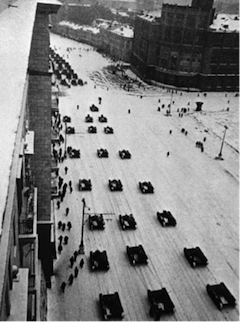

|
Leningrad and Moscow  Red Square, 7 November 1941 Meanwhile they reached the shores of Lake Ladoga, effectively surrounding Leningrad by 8 September. Hitler decided to lay siege to Leningrad and starve its population out of existence rather than to conquer it. As the birthplace of the Revolution, Leningrad had a huge symbolic importance. It could not be abandoned by the Soviets. Stalin sent his top commander, General Zhukov, to try to save it. Propaganda urged the city's population not to leave. Many chose to stay. One third of city's population (around a million people) died from cold, starvation and disease before the siege was lifted in January 1944. Hitler concentrated his main forces on the conquest of Moscow. Soviet forces on the Moscow Front were forced back in disarray. On 15 October, Stalin ordered the evacuation of the government to Kuibyshev on the Volga. Panic spread as the bombing of the city became more intense. Stalin made a radio broadcast pledging to defend the city to the end. If the Germans captured it, the whole country would be split in two. Muscovites rallied to the defence of the capital. They dug defences on the city's edge, carted food and medicines to the front (only 30 kilometres from the Kremlin at the height of the fighting), and cared for injured soldiers in their homes. On 7 November Stalin made the bold decision to hold the Revolution Day parade on Red Square as usual. The political significance of holding the parade at this crucial moment outweighed the considerable risks of an aerial bombardment, he believed. In his speech from the Lenin Mausoleum, Stalin called on the troops to emulate the Red Army spirit of the Civil War, 'when our country was in a still more difficult position.' Watch this film of Stalin's speech on 7 November 1941. How effective do you think it is as a war speech? By mid-November the German forces had become bogged down in winter mud and snow. Exhausted after five months of marching and fighting, they were unprepared for the Russian winter. The Soviets launched a counter-offensive, and by April had pushed the Germans back towards Smolensk. The defence of the capital was a huge uplift for Soviet morale. People started to believe in victory. |
© 2014 Orlando Figes | All Rights Reserved